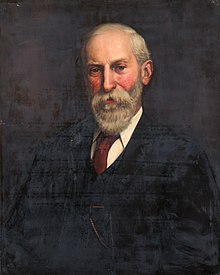Edward Stanley, 4th Baron Stanley of Alderley
Edward Lyulph Stanley, 4th Baron Sheffield, 4th Baron Stanley of Alderley and 3rd Baron Eddisbury PC (16 May 1839 – 18 March 1925) was an English peer.
The Lord Stanley of Alderley | |
|---|---|
 | |
| Member of Parliament for Oldham | |
| In office 27 April 1880 – 18 December 1885 | |
| Preceded by | Frederick Spinks |
| Succeeded by | James Mackenzie Maclean |
| Member of the House of Lords Lord Temporal | |
| In office 11 December 1903 – 18 March 1925 Hereditary peerage | |
| Preceded by | The 3rd Baron Stanley of Alderley |
| Succeeded by | The 5th Baron Stanley of Alderley |
| Personal details | |
| Born | 16 May 1839 |
| Died | 18 March 1925 (aged 85) |
| Political party | Liberal Party |
Life
editHe was the son of Edward Stanley, 2nd Baron Stanley of Alderley, and the former Henrietta Dillon-Lee. He attended Eton College between 1851 and 1857, gaining the Tomline Prize for mathematics in 1857. He read Greats at Balliol College, Oxford, gaining a first-class degree and fellowship to the college in 1861. He was called to the bar in 1865.
Stanley (then known as the Honourable Edward Lyulph Stanley) contested Oldham, in the Liberal interest, at elections in 1872, 1874, 1880 and 1885. He only won the 1880 contest and served in the House of Commons during the 1880–1885 Parliament. He inherited the title of Baron Stanley of Alderley in 1904, following the death of his brother. He was appointed a Privy Counsellor in 1910.
Stanley was a member of the London School Board from 1876 to 1885 and also from 1888 to 1896. He wrote a book Our National Education (1899).[1][2]
Family
editStanley married Mary Katherine Bell, daughter of Lowthian Bell, on 6 February 1873. They had eight children:[3][4]
- Katharine Florence Clementine Stanley (died 1884)
- Henrietta Margaret Stanley (1874–1956), married William Edmund Goodenough.[5]
- Arthur Stanley, 5th Baron Stanley of Alderley (1875–1931)
- Edward John Stanley (1878–1908)
- Lt.-Col. Oliver Hugh Stanley (1879–1952)
- Sylvia Laura Stanley (1882–1980), married Anthony Morton Henley, and was mother of Rosalind Pitt-Rivers.[6][7]
- Blanche Florence Daphne Stanley (1885–1968), married Eric Pearce-Serocold.[8]
- Beatrice Venetia Stanley (1887–1948)
Arms
edit
|
References
edit- ^ "STANLEY of Alderley, 4th Baron". Who's Who. Vol. 59. 1907. p. 1662.
- ^ The Hon. E. Lyulph Stanley (1899). Our National Education. London: James Nisbet & Co., Ltd.
- ^ Mosly, Charles, ed. (19 December 2003). Burke's Peerage, Baronetage and Knightage: in three volumes. Vol. 3 (107 ed.). Burke's Peerage. p. 3721. ISBN 9780971196629.
- ^ Curthoys, M. C. "Stanley, Edward Lyulph". Oxford Dictionary of National Biography (online ed.). Oxford University Press. doi:10.1093/ref:odnb/36244. (Subscription or UK public library membership required.)
- ^ Brodie, Marc. "Goodenough, Sir William Edmund". Oxford Dictionary of National Biography (online ed.). Oxford University Press. doi:10.1093/ref:odnb/33452. (Subscription or UK public library membership required.)
- ^ "Papers of Sylvia Henley". University of Oxford. Retrieved 28 December 2015.
- ^ Cavalieri, Ralph R. (1993). "Rosalind Pitt-Rivers, PhD, F.R.S.: A Personal Tribute". Thyroid. 3 (2): 77–79. doi:10.1089/thy.1993.3.77.
- ^ Mary Soames (February 2001). Winston and Clementine: The Personal Letters of the Churchills. Houghton Mifflin Harcourt. p. 144 note 1. ISBN 0-618-08251-4.
- ^ Debrett's peerage & baronetage 2003. London: Macmillan. 2003. p. 1511.
- Who's Who of British members of parliament: Volume I 1832-1885, edited by M. Stenton (The Harvester Press 1976)